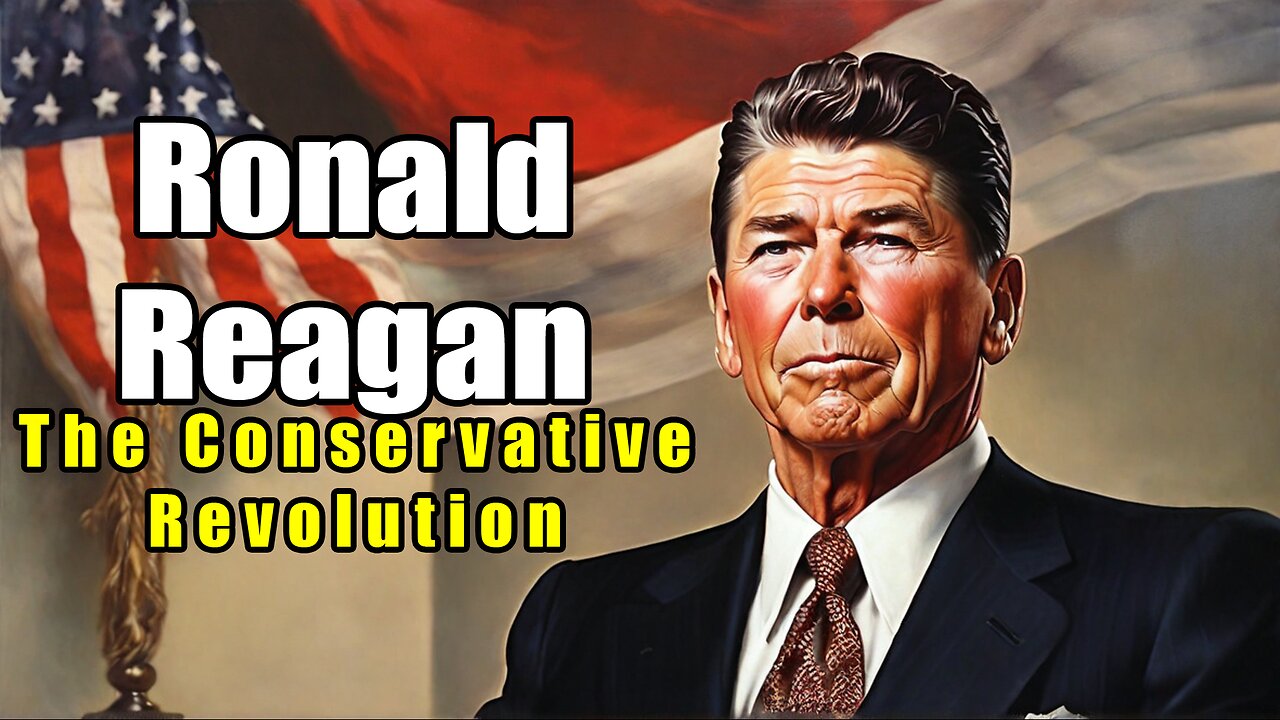Premium Only Content

Ronald Reagan - The Conservative Revolution (1911–2004)
Ronald Wilson Reagan (1911–2004) was the 40th President of the United States, serving from 1981 to 1989. A former actor and governor of California, Reagan played a crucial role in shaping American conservatism and is often associated with the "Conservative Revolution" that aimed to reduce the size of government. Here's an overview of Ronald Reagan's life and political career:
Early Life and Acting Career:
Birth and Childhood:
Ronald Reagan was born on February 6, 1911, in Tampico, Illinois.
Radio and Film Career:
Before entering politics, Reagan had a successful career in radio and film. He appeared in numerous movies and became a popular actor in Hollywood.
Entry into Politics:
Shift to Politics:
Reagan's interest in politics grew during his time as president of the Screen Actors Guild (1947-1952) and as a spokesman for General Electric in the 1950s.
Governor of California:
Reagan was elected as the Governor of California in 1966 and served two terms from 1967 to 1975. His tenure was marked by conservative policies and a tough stance against student protests.
Presidential Campaigns and Conservative Ideology:
1976 Presidential Campaign:
Reagan unsuccessfully sought the Republican nomination for president in 1976 but lost to incumbent Gerald Ford.
1980 Presidential Election:
Reagan successfully secured the Republican nomination in 1980 and won the presidential election against incumbent President Jimmy Carter.
Presidency:
Inauguration and Economic Policies:
Reagan was inaugurated on January 20, 1981. His economic policies, known as "Reaganomics," focused on tax cuts, reduced government spending, and deregulation.
Cold War and Foreign Policy:
Reagan took a strong stance against the Soviet Union, labeling it an "evil empire." His policies contributed to the eventual end of the Cold War.
Iran-Contra Affair:
The Reagan administration faced controversy over the Iran-Contra Affair, where officials facilitated the sale of arms to Iran and used the proceeds to fund anti-Sandinista rebels in Nicaragua.
Conservative Agenda:
Reagan pursued a conservative agenda, emphasizing free-market principles, a strong national defense, and limited government intervention.
Assassination Attempt:
Assassination Attempt:
On March 30, 1981, Reagan survived an assassination attempt by John Hinckley Jr. He recovered and continued his presidency.
Second Term and Legacy:
1984 Presidential Election:
Reagan was re-elected in a landslide victory in 1984, winning 49 out of 50 states against Democratic nominee Walter Mondale.
Legacy:
Reagan left office in 1989, and his presidency is often remembered for its impact on conservative ideology, economic policies, and the end of the Cold War.
Later Years and Alzheimer's:
Diagnosis of Alzheimer's:
In 1994, Reagan revealed in a letter to the American people that he had been diagnosed with Alzheimer's disease.
Death:
Ronald Reagan passed away on June 5, 2004, at the age of 93.
Ronald Reagan's presidency left a lasting impact on American politics, marking a shift toward conservatism and shaping the political landscape for years to come. His communication skills, often referred to as the "Great Communicator," and his advocacy for conservative principles have solidified his place as a significant figure in modern U.S. history.
-
 15:31
15:31
Breaking Points
1 day agoIs Trump Planning VENEZUELA Regime Change?
27.6K18 -
 2:06:05
2:06:05
"What Is Money?" Show
2 days agoTrump Family Bitcoin Bet Will Trigger Nation-State FOMO w/ Matt Prusak (CEO American Bitcoin)
9.34K -
 1:04:36
1:04:36
Dialogue works
3 days ago $3.66 earnedMohammad Marandi: Iran Just Gave Israel a FINAL Warning…
16.3K6 -
 9:20
9:20
daniellesmithab
1 day ago3 Bad Laws
18.9K7 -
 9:22
9:22
MattMorseTV
18 hours ago $11.18 earnedINDIA just made a BIG MISTAKE.
62K58 -
 12:11
12:11
Nikko Ortiz
17 hours agoCrashout 6 Rumble
15.5K3 -
 22:35
22:35
GritsGG
17 hours agoThe KILO is BACK! The Best AR on Warzone FRIES!
24K1 -
 2:16:36
2:16:36
Side Scrollers Podcast
20 hours agoStreamer KICKED OUT of Renaissance Fair for Misgendering + Spiderman MELTDOWN | Side Scrollers Live
46.1K8 -
 12:29
12:29
The Pascal Show
1 day ago $2.18 earnedLOCKED IN A DUNGEON?! Parents Arrested After 5 Children Found In 'Dungeon' At Home
17.5K3 -
 LIVE
LIVE
Lofi Girl
2 years agoSynthwave Radio 🌌 - beats to chill/game to
326 watching